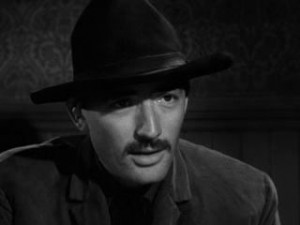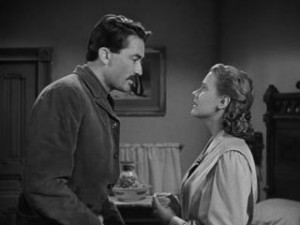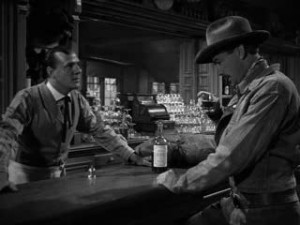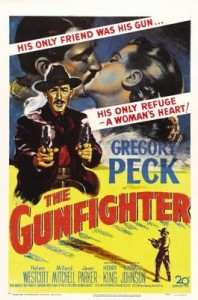His only friend was his gun… His only refuge – a woman’s heart!
The Gunfighter is one of the most atypical Westerns of its time. Lacking are the stereotypical clichés of fighting in the streets, stagecoach raids, and marauding bandits. The Gunfighter lacks all of the but still excels in spades. Sadly, in perhaps the greatest decade for the genre The Gunfighter is often overlooked for some also justifiably great films as High Noon and The Searchers.
Featuring miscast (at least on the surface) [intlink id=”187″ type=”category”]Gregory Peck[/intlink], a fine actor not normally known for Westerns, as aging gunfighter Jimmy Ringo, The Gunfighter presents us with perhaps the first serious western. Also a highlight are a strong supporting cast, including Helen Westcott (as Ringo’s ex-wife) and [intlink id=”1128″ type=”category”]Karl Malden[/intlink] (as the bartender Mac).
 Peck’s Jimmy Ringo presents perhaps his finest role over his illustrious career, even topping that of Atticus Finch in To Kill a Mockingbird. At the film’s opening, after a long ride and looking just for a place to stay and a drink, Ringo is forced reluctantly to kill another man (played by Richard Jaeckel). Here we begin to realize that rather than the idealized and perhaps glamorous ideal we are presented with elsewhere, the life of a gunfighter with a reputation is more a curse. This is a theme which is played out masterfully throughout the film.
Peck’s Jimmy Ringo presents perhaps his finest role over his illustrious career, even topping that of Atticus Finch in To Kill a Mockingbird. At the film’s opening, after a long ride and looking just for a place to stay and a drink, Ringo is forced reluctantly to kill another man (played by Richard Jaeckel). Here we begin to realize that rather than the idealized and perhaps glamorous ideal we are presented with elsewhere, the life of a gunfighter with a reputation is more a curse. This is a theme which is played out masterfully throughout the film.
Following this, Ringo’s final planned shootout, he heads for a small town (tailed by a gang all the way), which incidentally has quite a bit of history for Ringo. Here is old friend Mac (Karl Malden), tending the local bar, and Marshal Mark Strett (played by Millard Mitchell). The Marshall is a former gang member with Ringo and presents perhaps the life that could have been Ringo’s had he turned away from the path he ultimately chose.
 Lastly, but more importantly, are his ex-wife Peggy (played by Helen Westcott) and his son, who he has never seen. Ringo has really returned to see them, and attempt, after first getting Peggy to even see him, to move away and finally settle down- somewhere where Ringo isn’t known and every young punk isn’t looking to make a name for himself by knocking him off.
Lastly, but more importantly, are his ex-wife Peggy (played by Helen Westcott) and his son, who he has never seen. Ringo has really returned to see them, and attempt, after first getting Peggy to even see him, to move away and finally settle down- somewhere where Ringo isn’t known and every young punk isn’t looking to make a name for himself by knocking him off.
During his “pitch” of the idea Ringo gives it his best, but it comes across as if he really knows that this ship has already sailed, but without him on it. By this time, Ringo has borrowed all the time he can until the pursuing gang enters town, and he has to say goodbye, after a quick discussion with his son, and head for the next stop as the curtain falls.
An extremely well done film, it is hard to see why it isn’t more acclaimed now. Director Henry King does well building suspense without action and coupled with Gregory Peck’s fine performance we can really feel his fatigue and readiness for a change in his life’s path. Peck’s period mustache, authentic as it may be, is a distraction, although perhaps only in retrospect as one so rarely sees him anything but clean shaven. (Although, that being said, The Gunfighter did not do well at the box office, and this mustache took part of the blame at the time.)
Along with To Kill a Mockingbird, The Gunfighter was one of Gregory Peck’s favorites among his filmography and thankfully it can be gotten pretty readily either through the streaming services or on ye old fashioned DVD. This latter is offered as part of a three disc set including Rawhide and The Garden of Evil, both strong if somewhat lesser films. The Gunfighter was made at a high point of Peck’s career, coming after the classic 12 O’Clock High and prior to 1951’s Captain Horatio Hornblower, R.N.
The latter would never be confused with his finest work, but it is a personal favorite.
 Interestingly as well is the musical score, or lack of it. Outside of a rousing main title- playing while Peck rides across the landscape, we have no music whatsoever again until the closing moments. Darn that Alfred Newman! Perhaps the music was felt to be a potential distraction (which may be a point given the fine tension and drama onscreen) but an Alfred Newman title track only? Oh well, what could have been.
Interestingly as well is the musical score, or lack of it. Outside of a rousing main title- playing while Peck rides across the landscape, we have no music whatsoever again until the closing moments. Darn that Alfred Newman! Perhaps the music was felt to be a potential distraction (which may be a point given the fine tension and drama onscreen) but an Alfred Newman title track only? Oh well, what could have been.
Highly recommended for all, especially those who don’t like westerns. It might convert you yet.
